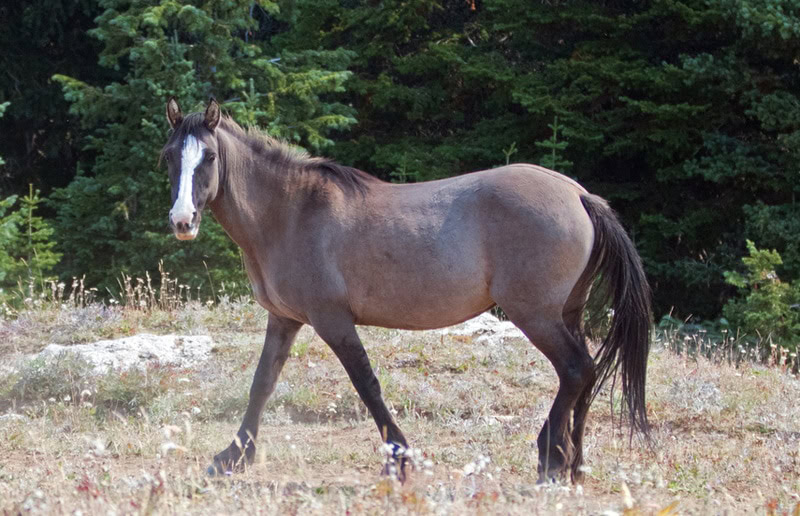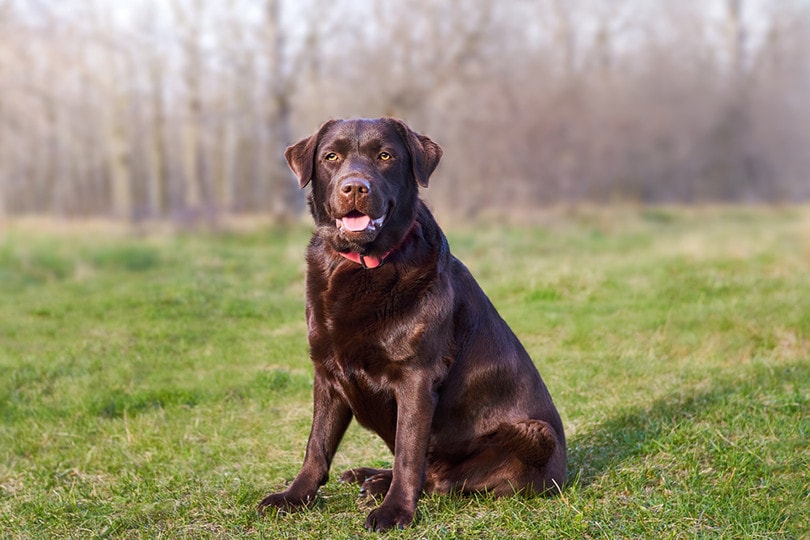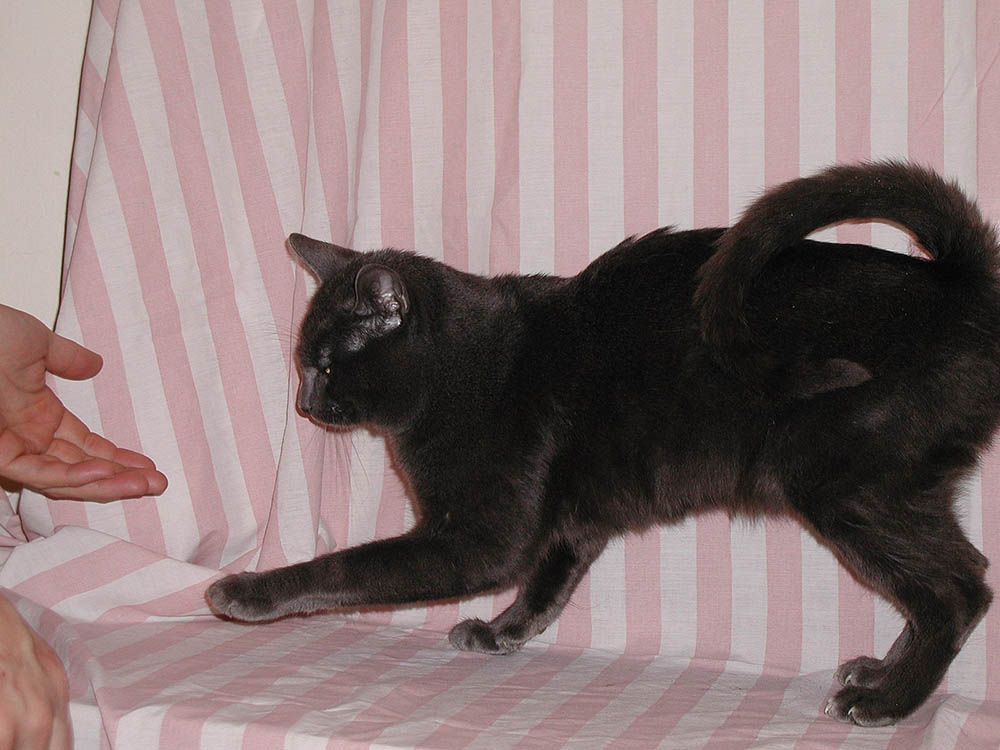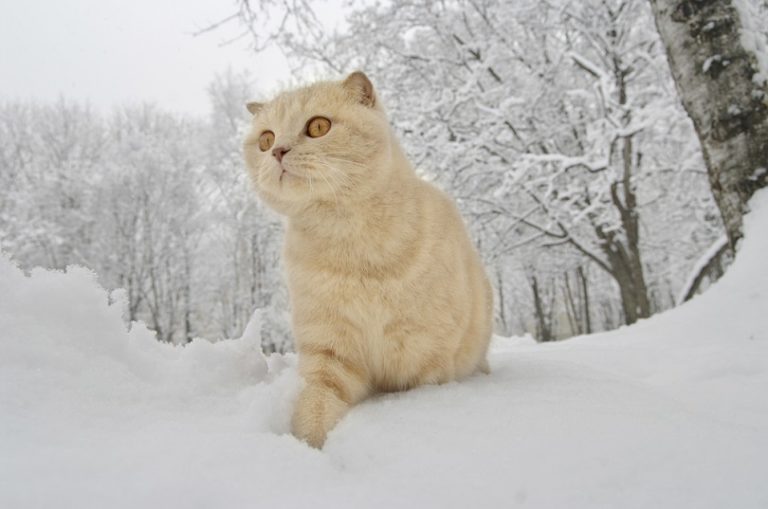Click to Skip Ahead
The Grulla or Grullo horse isn’t a specific breed but rather a coat color. The Grulla is a mare, and the Grullo is a stallion (or gelding), but both have the dun (gray) color they’re known for. We’ll use “Grulla” throughout the following article for both.
Because they carry the dun dilution gene and a gene for black hair, Grulla horses have “mouse-colored” hair. However, there are many shades of Grulla horses, including slate, silver, blue, mouse dun, and several more. We’ll discuss more about this fascinating coat color below.

Breed Overview
Note: The following traits are based on the American Walking Pony
| Care Level | High |
| Temperature | Between 18° and 59°F |
| Temperament | Friendly, outgoing, calm |
| Colors | All solid colors, including black, brown, dun, roan, champagne, palomino, grullo |
| Lifespan | 25-30 years |
| Weight | 600 pounds (272 kg) |
| Height | 14 hands (56 inches, 142 cm) |
Regardless of the breed, a Grulla horse must have similar markings. First, the horse’s head must be noticeably darker than its body. A Grulla’s legs will be darker, usually brown or with black markings, and their ears must have dark tips. Lastly, Grulla-colored horses must have a dorsal stripe from their backs down to their tails.
Some Grulla variations have stripes on their legs or dark rings around their eyes. Others show stripes on their shoulders, neck, forehead, and back, while a small number have white or cream-colored guard hairs on their tails and manes.
Grulla/Grullo Characteristics
Note: Characteristics based on the American Walking Pony

What Are Grulla Horses Used For?
Because Grulla is a coat color and not a breed, the uses for a Grulla horse can vary from breed to breed. For example, cowboys often use Quarter Horses with the Grulla color to direct cattle. Heck Horses with the Grulla color are often used for general riding and as therapeutic riding horses. Welsh Ponies born with the Grulla color can be seen on riding trails and carriage driving competitions. Again, it all depends on the breed.
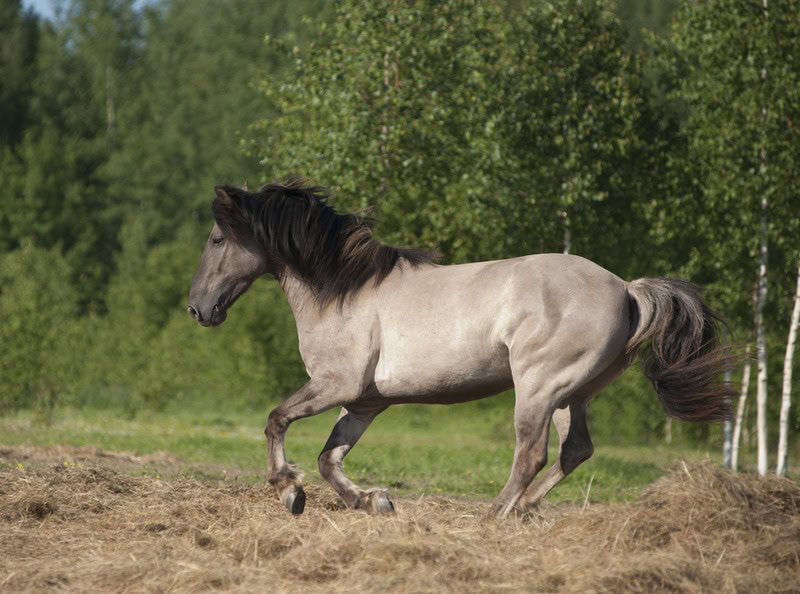
Where Did These Horses Originate From?
Since the Grulla horse is a color and not a breed, it’s impossible to say where a specific horse with the Grulla color originated. The name Grulla (and Grullo) is believed to have originated in Spain, and today, there are many breeds with the Grulla color.
Some of these horses include the Heck Horse, Highland Pony, and Quarter Horse. Miniature ponies can also have the Grulla color. Lastly, some of the first horses with the Grulla color are believed to have come from Central Asia.
Temperament and Intelligence of the Grulla/Grullo Horse
Because Grulla horses can be a wide variety of breeds, their temperament and intelligence varies. Some are calm, affectionate, and smart, and others are not as friendly or easy to train.
The determining facts will be the horse’s breed and the care and attention the animal receives while being raised. An intelligent horse raised by a lousy owner may have a negative temperament and vice versa.
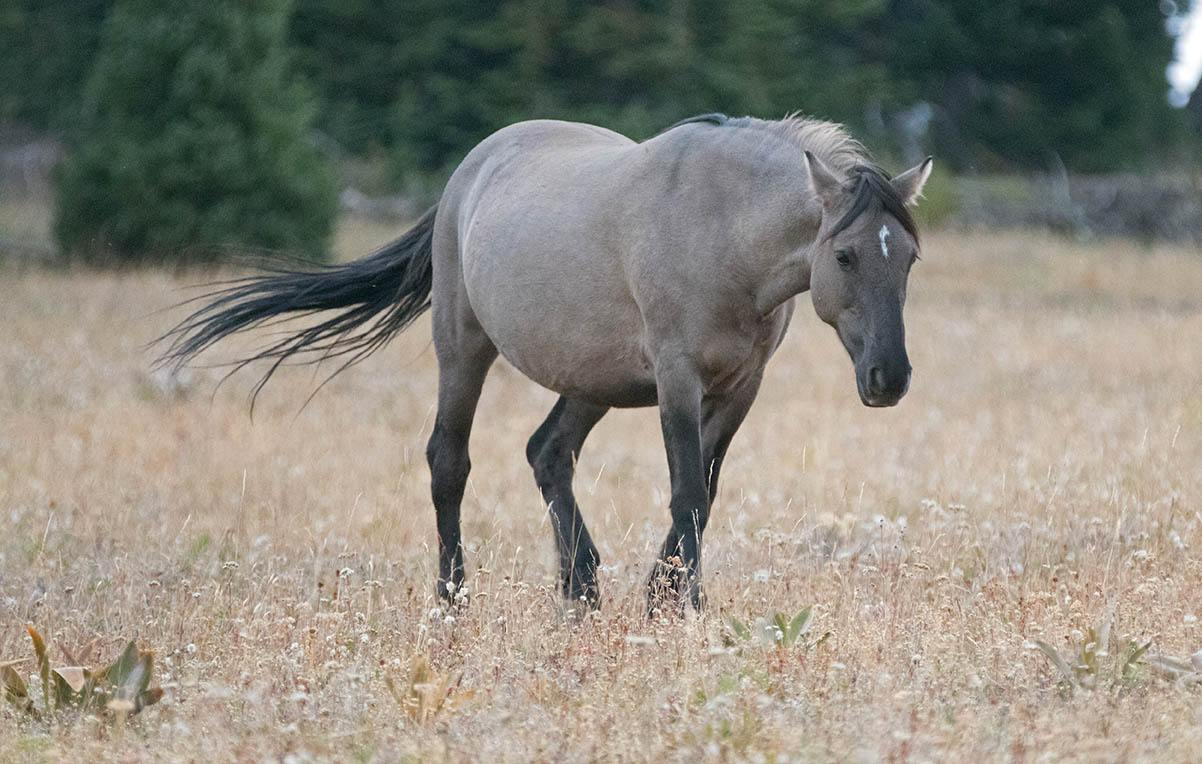
Appearance & Varieties
The Grulla horse color can appear on many breeds; thus, the appearance and variety of a Grulla will vary from one to the next. All have the distinct Grulla gray or dun color the coat is known for, but the horse’s pattern can differ. The breeds of horse that can come with the Grulla color include the following:
- American Walking Pony
- Appaloosa
- Australian Pony
- Azteca
- Criollo
- Curly Horse
- Florida Cracker Horse
- French Saddle Pony
- Gotland Pony
- Irish Draught
- Kazakh Horse
- Kentucky Mountain Saddle Horse
- Konik Pony
- Missouri Fox Trotter
- Mustang
- Nokota Horse
- Pryor Mountain Mustang
- Quarter Horse
- Sandalwood Pony
- Sorraia
- Spanish Jennet Horse
- Spanish Mustang
- Swiss Warmblood
- Tarpan
- Tennessee Walking Horse

Things to Know When Owning a Grulla/Grullo Horse
Habitat & Stable Requirements🌾
As with all breeds, the Grulla must have as much room to exercise outside as possible. Horses also require a dry area, indoors or out, to stand up or lie down comfortably. They also need a sheltered area to take refuge from the sun, rain, and wind.
The fencing around your Grulla horse’s paddock should be sturdy and escape-proof. If you keep your Grulla in a stable, it should be free of drafts, cleaned regularly, and ventilated sufficiently to provide fresh air. Also, dust-free bedding should be put down and kept clean. Lastly, a fire emergency plan should be in place and posted conspicuously in a stable.
Food & Diet Requirements🥕
Grulla horses need grazing fields free of toxins and toxic plants like all horses. Since horses are herbivores, they need copious amounts of grass, hay, and haylage. Depending on the breed of your Grulla horse, you can also feed them extra salt (as a salt lick), fruits, and vegetables.
Since many breeds have the Grulla color, it’s best to check with your veterinarian to determine exactly what to feed your horse. No matter the breed, however, your Grulla will need access to an abundant supply of fresh, clean water.
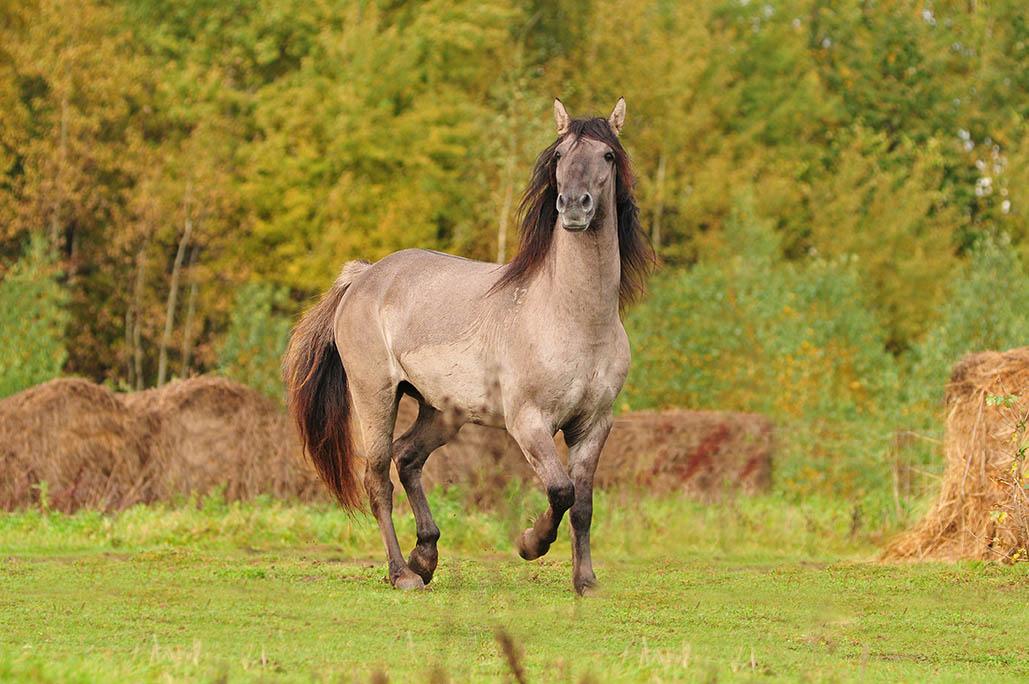
Exercise🐎
A horse out in the field grazing will usually get all the slow, steady movement it needs to stay healthy. However, occasional runs at full speed are also a good idea. Most horses will do this independently if they have plenty of room in their paddock.
Training🐴
The amount and type of training you give your Grulla will depend on its specific breed and what it will be used for. For example, training a horse to accept riders can take between 30 and 180 days. However, for a horse that will be trained in some type of specialty like racing or a police horse, it will take longer.
Grooming✂️
The average Grulla horse needs to be groomed at least three times a week, but their grooming schedule also depends on the breed. Some may need daily grooming, which includes brushing and combing their coat and mane.
If you groom your Grulla regularly, each grooming session should take between 20 and 40 minutes. You must also check your Grulla’s eyes and ears regularly.
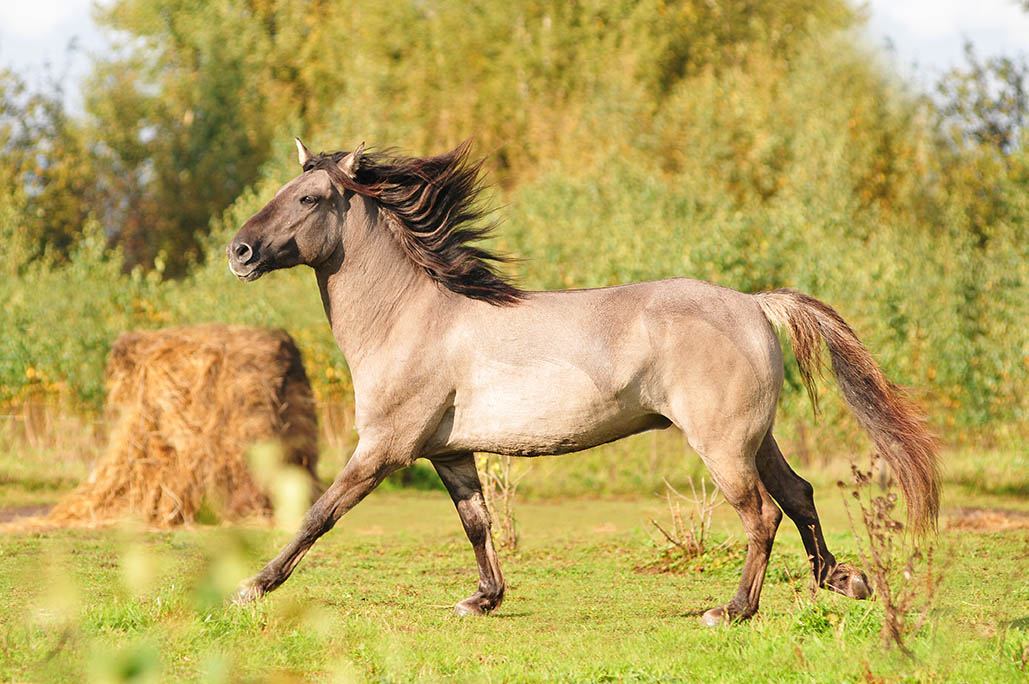
Lifespan & Health Conditions🏥
A Grulla horse’s lifespan and health conditions differ from one to the other depending on their specific breed. The average horse lives between 25 and 30 years, but some live into their 40s, 50s, and even 60s.
Horses can suffer from various health conditions. Arthritis and back problems are common, especially for horses ridden regularly. So-called “mud fever” is also a problem for horses forced to stay in wet and muddy conditions.
- Colic
- Common colds
- Ringworm
- Inflammatory bowel disease (IBD)
- Laminitis
- Equine herpes virus
- Arthritis
- Back problems
- Mud fever

Male vs Female
Besides the noticeable differences between the sex organs and breeding capacity of male and female Grulla horses, there are several other differences you should know about. Geldings, for example, are Grullo horses that have been castrated, which significantly changes their behavior and physical appearance.
Male Grullos are usually (but not always) stronger and faster than females, and because they don’t go through hormonal changes, they tend to become ill less frequently. Females (aka mares) are more docile and often easier to train than males. They also tend to stay calmer in situations that make many male horses agitated.


3 Little-Known Facts About Grulla/Grullo Horses
1. The Grulla Color Is Only Seen When a Black Horse Is Mated With a Chestnut (Dun) Mare. Also, the Resulting Foal Must Have the Dilution Gene.
It’s a pretty rare combination, to be sure, and there’s no guarantee it will always work.
2. You Can’t Always Tell if a Horse Is a Grulla by Sight.
In many cases, genetic testing is needed to be 100% sure. Some foals born with a coat that looks like the Grulla color end up with a black coat instead.
3. Grulla Horses Don’t Have any Extra Genetic Issues Due to Their Color.
When cared for well, a Grulla horse will have no more health issues than any other horse.

Final Thoughts
As we’ve seen, Grulla or Grullo refers to a horse’s coat color, not a specific breed. Only 18 horses and ponies can have the Grulla color, which is typically gray dun or “mouse hair” and comes with a small number of distinct markings and color variations.
It is a rare color often seen more in wild horses than in domestic breeds. The Grulla and Grullo-colored horses are gorgeous and distinct thanks to their dun dilution gene. No matter the breed, a Grulla or Grullo horse is a beautiful sight to behold.
You Might Also Be Interested In:
- https://www.rspca.org.uk/adviceandwelfare/pets/horses/environment
- https://spana.org/blog/what-do-horses-eat/#:~:text=In%20simple%20terms%2C%20horses%20eat,should%20eat%20to%20remain%20healthy.
- https://kb.rspca.org.au/knowledge-base/how-much-should-i-exercise-my-horse/
- https://www.webmd.com/pets/how-long-do-horses-live#:~:text=The%20average%20horse%20lives%20for,Nutrition
- https://www.petmd.com/horse/breeds/c_hr_american_walking_pony#
Featured Image Credit: HTurner, Shutterstock
